Oprah’s 2020 Vision Tour: Kate Hudson
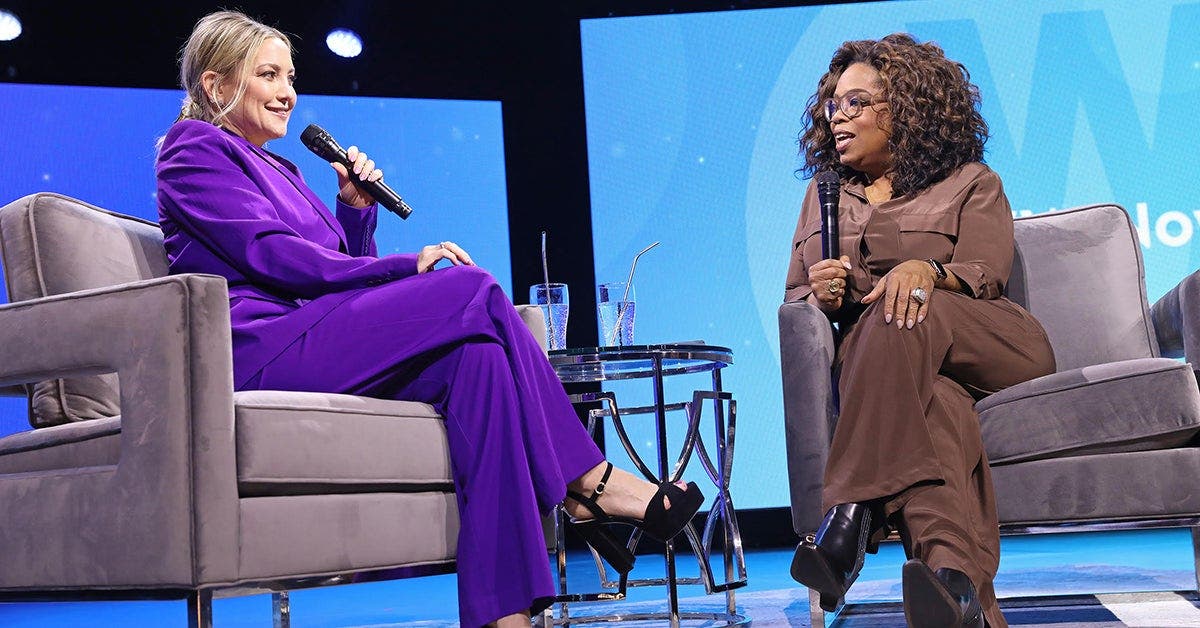
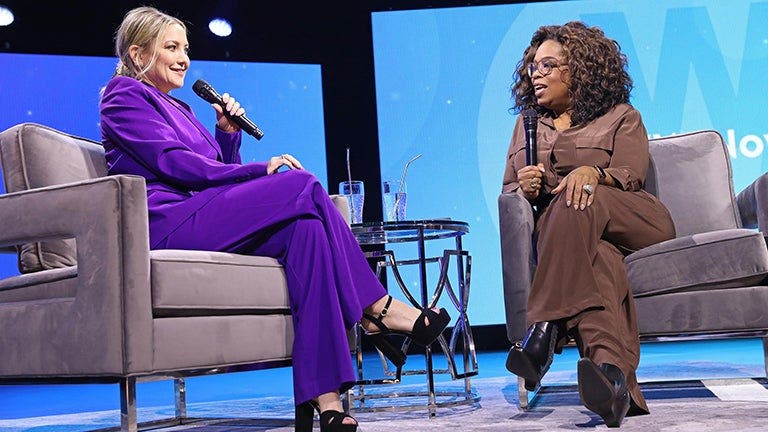
Watch Oprah interview Kate Hudson below:
Read the full transcript:
OPRAH: We've been loving our visionary conversations so far. And, San Francisco, you're in for a treat. Because Oscar nominee, mom of three, athletic-wear mogul Kate Hudson, brightens any room or arena, even one that holds 15,000 people. San Francisco, please welcome our WW 2020 visionary conversation, Kate Hudson.
(Kate Hudson entrance.)
OPRAH: You're wearing that suit, girl.
KATE: I am. You know why I chose Purple?
OPRAH: Why?
KATE: Because I'm Purple. I'm a Purple program on the [myWW] program.
OPRAH: Oh, Purple.
KATE: Team Purple.
OPRAH: Which means you get—which means you get?
KATE: Sixteen points.
OPRAH: Sixteen points.
KATE: Yeah, but I'm liking it. I really like it.
OPRAH: Yeah, I couldn't do that one. No, it doesn't allow for—it doesn't allow for your vodka later in the day.
KATE: Well.
OPRAH: Maybe a little bit. The last time we saw each other was on FaceTime. It's nice to see you.
KATE: I'm so happy to be here.
OPRAH: Are you enjoying the program?
KATE: I love it. I absolutely love it. But I think there's probably 15,000 people here who understand why. It's funny because I was—you know, I think that once I started Fabletics and I got into the wellness community and active lifestyle, it's kind of the number one thing people ask all the time is about balance and food and diet seems to be, like, on everybody's—on the forefront of everybody's mind. And for me, I had a great teacher. Right? My mom. She's always active. She's always—(applause)—and I feel really lucky that way. But I understand that a lot of people weren't raised with that kind of teacher. And to have a support system is enormous in a lifestyle journey. And WW, when I talked to [WW CEO] Mindy and I got to get to know her—
 OPRAH: You started because you wanted to lose 25 pounds after the baby. Right?
OPRAH: You started because you wanted to lose 25 pounds after the baby. Right?
KATE: Well, yeah. I just had a baby and it was really, honestly, because I wanted to get behind something like this that had a community that was so inspiring. Because I think that—that's a huge part of any wellness journey.
OPRAH: Yeah. And I knew it wasn't just about losing weight. But you wanted to be a part of the whole wellness fabric in the city and the country.
KATE: Yeah.
OPRAH: And I love that you filmed yourself right after the holidays on the scale. That you filmed yourself on the scale right after the holidays.
KATE: I did.
OPRAH: And you felt like—it sounded like, to me, that you were—you felt like you were going to be maybe 10 or 12 pounds over your fighting weight.
KATE: Yeah, oh, yeah. A solid. A solid 12.
OPRAH: And you weren't thrilled, but you also weren't the least bit embarrassed. No shame involved. Or it seemed that way.
KATE: No, no, no shame.
OPRAH: That's my number. Yeah.
 KATE: Yeah, I think after having three kids you're sort of like, you know, the fluctuations are a part of life. You know? And I like the scale. And honestly, I didn't even think about it. I think with social media now today I didn't even think like, oh, wow, I'm showing my—
KATE: Yeah, I think after having three kids you're sort of like, you know, the fluctuations are a part of life. You know? And I like the scale. And honestly, I didn't even think about it. I think with social media now today I didn't even think like, oh, wow, I'm showing my—
OPRAH: I'm 20 pounds heavier, right.
KATE: Yeah, no, I think—I think shame—no. No. I just want to live. I just want to live whatever I am, you know, and do my best.
OPRAH: I love this. I love when you turned—I think this is when you were turning 40? Or last year for your 40th birthday Reese Witherspoon posted, ‘I've known this beauty since she was 12. She's always been the most optimistic and joyful.’ And I think that the very—it reminded me of the time—the first time I interviewed your mother. And I said, ‘Wow, you're the most joyful person, Goldie Hawn, I've ever met.’ So do you think you inherited that joy gene?
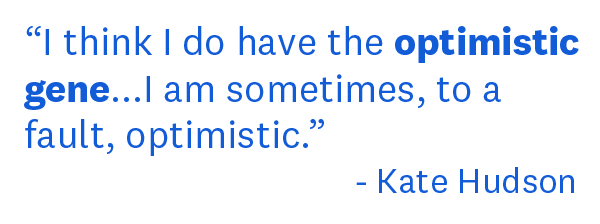 KATE: A tornado of joy is mom. That's what it feels like. I think some of it. My mom is just an extraordinary light being. And—yeah. But, yes, I think—I think I do have the optimistic gene. And I think that it's a rare thing to have. And I recognize that it's something that you do have to continually work at. But I am sometimes, to a fault, optimistic. You know, sometimes it's, like, okay, stop—my friends. Stop being so optimistic. Just be, like, annoyed right now.
KATE: A tornado of joy is mom. That's what it feels like. I think some of it. My mom is just an extraordinary light being. And—yeah. But, yes, I think—I think I do have the optimistic gene. And I think that it's a rare thing to have. And I recognize that it's something that you do have to continually work at. But I am sometimes, to a fault, optimistic. You know, sometimes it's, like, okay, stop—my friends. Stop being so optimistic. Just be, like, annoyed right now.
OPRAH: So you see the best in everything?
KATE: I try. I really try. I do. I mean, I just—I think it's more like—some people see it as morbid. But I see it as just light. I think in my mind it's, like, one day I'm gonna die. And, like, I'm always thinking like that. So what am I going to do today when I'm going to live? And it's that simple. And I—I don't want to—I don't want to sit in the—in the shit.
OPRAH: Fiona's here. You can't say shit. Fiona's 12.
KATE: Sorry. I'm sorry.
OPRAH: Sit in the poop.
KATE: Okay, poopy.
OPRAH: It's interesting. If you're sitting in poop, it doesn't feel as bad as shit.
KATE: (Laughter.)
OPRAH: It just feels like poop.
KATE: You know, I think I figured out I have a propensity towards drama because I like—because I'm an actress. But I don't like the feeling of—of negativity. And so for me, I'm always trying to figure out how to—
OPRAH: Okay, so what are you telling yourself these days? Because how does somebody who's, you know, optimistic to a fault, move through the world, this world, that seems to be filled daily with more and more negativity? Just in every direction.
KATE: I try to shut it off. And I think—I think you can be—you can be connected. I think—a part of me feels like we're overconnected sometimes. Where, you know—
OPRAH: Let the church in the back say—
ALL: Amen.
OPRAH: —amen.
KATE: I really do like connecting with people. And sometimes I find that technology, it—it really messes me up. And seeing tickers of bad news and death and—and, you know, stuff that I think once upon a time we really only heard what was going inside of our community. And I love that we're connected globally but I think it's really hard on all of us and it creates a lot of anxiety.
OPRAH: Are you on social media a lot?
KATE: I—yes. But I try not to. You know, I'm very good—I think we need to have more digital cleanses as much as we do food cleanses.
OPRAH: Yeah.
KATE: You know?
OPRAH: Do you do digital cleanse?
KATE: Yeah, I do. I shut it down.
OPRAH: So what are the hours that you, like, are not going to do it?
KATE: 5:00. Phone gone.
OPRAH: 5:00?
KATE: Phone gone. Like down. All things. 5:00 p.m.
OPRAH: Until the next day?
KATE: Until the next morning.
OPRAH: That is really good.
KATE: That's the goal.
OPRAH: Oh. That's the goal.
KATE: Usually that's the goal. (Laughter.)
OPRAH: (Singing.) "I wish upon a star." I wish I could put my phone down.
KATE: I'm like sneaking and—so, like, 8:00—
OPRAH: So really what's the real thing that you do? The real thing.
KATE: I put my phone down at 5:00. And then sometimes if I really have to be on my phone if I have to—
OPRAH: Okay.
KATE: —if I have to be on a call at 7:00 because of time differences or something, then I—but I really try to put my phone down. And all the kids. We try to go—you know.
OPRAH: You know what is surprising to me about you, you are so balanced and likable for somebody who was raised so rich. And I mean that in the nicest way, rich people. But you are so balanced and likable. True this. For somebody who was raised not just wealthy but in the—in the limelight. And you know you meet a lot of people who come from famous people. A lot of people who have grown up and they are not nice people.
KATE: Yeah, I grew up with them.
OPRAH: So you knew.
KATE: Oh, my God.
OPRAH: Because you don't get to find your own identity. And how were you able to do that?
KATE: It was like my parents almost—I mean, it was almost overkill how—how fiercely they raised us to not be spoiled children. Like to the point where it was, like, maybe they went a little too far in this department. You know? But it was like we—we knew that our privilege had nothing to do with us and everything to do with luck and their work ethic. And—and so I think in our—our minds, what we saw, was work ethic. We didn't see rich or privileged.
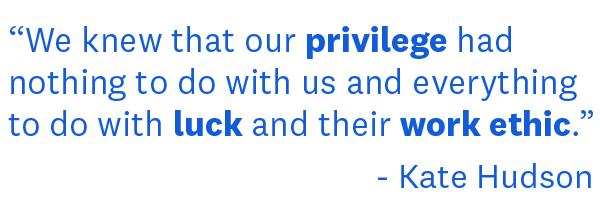 OPRAH: You didn't? Even though you were raised by—
OPRAH: You didn't? Even though you were raised by—
KATE: No, I understood it as I got older. But I saw how hard they worked. Like my mom and Kurt, they just—they worked so hard. And they—and they love it and they're passionate about it. And so I think—I think that's it. And they had no patience for any kind of spoiled behavior. And everything with them is about connectivity. With, like, how you look someone in the eye and on a daily basis how we connect. I just—you know. I mean, anytime we had anything of real privilege, it was, like, you know, they made it very clear that we were a guest in that world.
OPRAH: Yeah.
KATE: You know. This isn't yours.
OPRAH: You're in my house.
KATE: No. You sit down there and you say please and thank you.
OPRAH: So did you—it's interesting that you and your brother [Oliver Hudson] kept the name Hudson.
KATE: Yeah, that is interesting. Yeah.
OPRAH: Even though you were raised by Kurt who was, like, a father to you. Did your father [Bill Hudson] play a bill role in your life? Bill Hudson?
KATE: I mean, I'm proud of the name Hudson. I—because Bill, you know, he— he's a huge part of what I am. And some of my gifts that I—that I cherish. Like music. You know, my father's—my real father's a musician and he's a wonderful musician. And I connect to him through that, even though I don't connect with him through any kind of real paternal relationship. But I think it was important to keep that name, you know. And I also—I also feel like, you know, there was a moment in my life where I did want to reject anything that had to do with my father or the name. And I thought, oh, maybe I'll be Kate Russell. Or maybe I'll just change it to Kate Garry, you know. But, I don't know, it's a huge part of my identity, that relationship. Challenging not in my life, you know. And—but, again, those things are what make you who you are and it sort of informs the work that you do and—emotional work and the relationship that you have.
OPRAH: Absolutely. You end up—you know, everybody does this, whether you know it or not, you end up—I learned this years ago from a wonderful guy named Harville Hendrix who was on the show.
KATE: Oh, he's wonderful.
OPRAH: Yeah. Oh, Getting the Love You Want. The imago theory. So this is the theory. This is true of my relationship with Stedman and I would not be with Stedman had I not done Harville Hendrix a year before Stedman and I met.
KATE: Oh, I mean —
OPRAH: Because his theory is, you are attracted to your romantic partners based upon what you are trying to heal in your past. So basically, the relationships that you had or didn't have with your parents shows up and is going to be triggered by your current partner.
KATE: It is triggered.
OPRAH: That is true. So you think—you think you're getting away from it, but you never are getting away from it. You're just drawing into your life that which needs to be healed. And when stuff goes wrong, it's really all about not what's happening right here, but what's happened before that wasn't healed.
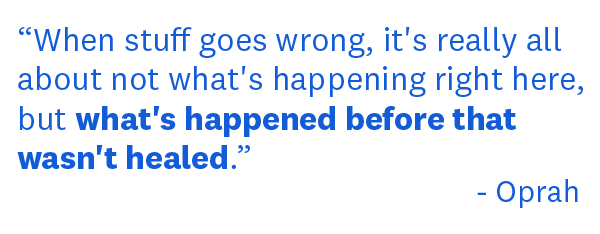 KATE: Completely. And, you know, when you're an intellectual person, you can think that you know it, but you almost have to feel that at a cellular level to make change I think sometimes. You can think I know why I have this issue in my relationship. My father abandoned me. But then you keep repeating the same patterns, the same mistakes, and you have to, like, actually feel the trauma and move through it, I think. And—and that book actually changed my life for the—it made me get out of a relationship, you know, and be in a better version.
KATE: Completely. And, you know, when you're an intellectual person, you can think that you know it, but you almost have to feel that at a cellular level to make change I think sometimes. You can think I know why I have this issue in my relationship. My father abandoned me. But then you keep repeating the same patterns, the same mistakes, and you have to, like, actually feel the trauma and move through it, I think. And—and that book actually changed my life for the—it made me get out of a relationship, you know, and be in a better version.
OPRAH: Harville's book?
KATE: Yeah. Oh, yeah.
OPRAH: I did not know that.
KATE: It's the best book. I think anybody, even if they're not in a relationship needs to read that book. Because everything that we do in our intimacy is played—is all about—
OPRAH: So what about that book made you get out of a relationship?
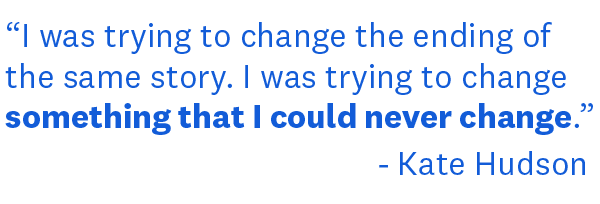 KATE: Because I realized I was chasing something that—that I was trying to change the ending of the same story. I was trying to change something that I could never change. I was trying to put a different ending on it. Instead of just, like, turning that channel off.
KATE: Because I realized I was chasing something that—that I was trying to change the ending of the same story. I was trying to change something that I could never change. I was trying to put a different ending on it. Instead of just, like, turning that channel off.
OPRAH: Okay. Can I share this with you briefly?
KATE: Yeah.
OPRAH: That book changed my relationship with Stedman. So, again, the book is called Getting the Love You Want. It was written like mid-'80s or something. And so Stedman and I had just recently started dating. He comes back from Walgreens and he is so upset. He said—I said, what happened? He goes, some guy was out there yelling, hey, Oprah Winfrey's boyfriend. Give me some money. (Laughter.) And so that was upsetting to you? He said, yes. It's upsetting to me because I have a name. And it's not Oprah Winfrey's boyfriend. Okay. I get that. So I said, well, you are my boyfriend right now and if you're gonna stay my boyfriend, I'm not gonna be apologizing for my name. So it's gonna—because of Harville's book, I was able to do that. So what I was able to say to him, listen to me, y'all. So Stedman grew up in a small town. He had two brothers who were mentally challenged. And when he was a little boy, people used to yell, hey, Stedman Graham, your family's crazy. So going to the Walgreens, having somebody yell, hey, Oprah Winfrey's boyfriend, is a trigger.
KATE: Oh.
OPRAH: Is a trigger that reminds him that somebody is calling you out of your name. That this isn't my identity. I'm not my brother's keeper. I'm not your boyfriend. So I say to him, this isn't about me. This is about your brothers. This is about the thing you've never worked out with your own family and your own identity and where you are in that place. And if we're gonna have a relationship, you need to know, I'm not backing down from the Oprah Winfrey thing.
KATE: Yeah. Clearly.
OPRAH: You know?
KATE: Thank God.
OPRAH: But I only knew that because I read Harville's book. I knew that, oh, this reaction isn't even about me. This is about the stuff in the—
KATE: Yeah, when you read something like that, you remember personalizing is, like, the death of communication in relationships.
OPRAH: Yes.
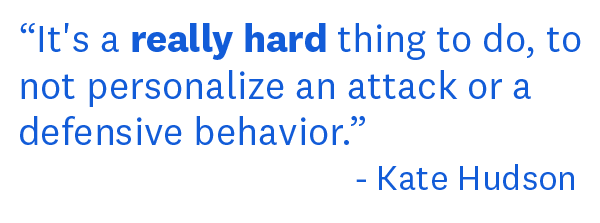 KATE: Yeah. And—and I've learned that through lots of trial and error. (Laughter.) But, yeah, it's a really hard thing to do, to not personalize an attack or a defensive behavior. It's such an amazing thing to be able to love somebody through their triggers, you know, so to speak. And I also think, to—
KATE: Yeah. And—and I've learned that through lots of trial and error. (Laughter.) But, yeah, it's a really hard thing to do, to not personalize an attack or a defensive behavior. It's such an amazing thing to be able to love somebody through their triggers, you know, so to speak. And I also think, to—
OPRAH: Or make the decision I'm not gonna love you for it.
KATE: Oh, no, thanks.
OPRAH: No, thanks. Yeah.
KATE: But I—yeah, I—relationship has been at the center of my—because when we talk about wellness all the time, it really is—it's always been at the center of mine. You know, food—discipline in food. Discipline in activity is something I—I—I feel in control of it.
OPRAH: Yeah.
KATE: It's relationships that have always been my—
OPRAH: I read where you said in your relationships that understanding and softening your fight or flight instinct has been your greatest journey in adulthood. What does that mean?
KATE: Yeah, okay. I'm a fighter. And if I'm not fighting, I'm flying. (Laughter.) Which means, like, I—I'm like a pit bull. And I—and my jaw clenches down. And it's like until I know that we're communicated and we're on the same page and I've been validated, I will fight. So much so that there's one particular relationship where someone looked at me and said, can you just put your sword away? Just put it away. And I realized I was flinging a sword.
OPRAH: Here's a question.
KATE: Okay.
OPRAH: Why are you such a pit bull?
KATE: Because I think that for me and my—in my life—this is like therapy. I never felt heard.
OPRAH: Really.
KATE: And I think a lot of people feel that way. It's hard to be heard.
OPRAH: Yeah.
KATE: And—and when you're a little girl and all you want is your daddy to hear you, and he doesn't, you sort of are chasing that for a really long time, until you realize, like, oh, that wasn't—
OPRAH: It wasn't even about you.
KATE: It wasn't—yeah, I don't need to do that, you know. So that I think triggered—I also think our fight or flight mechanism is real. And we're a survival animal. And so it's so easy for us to become reactive in that space, in that part of the brain. And we just immediately—you know, right now it's like—it's all about slowing that—that part of the brain down. The reactivity and trying to, like, move through it differently. It's hard for us to see that.
OPRAH: I heard you say that—this is true for me, too. I'm going to talk about this later. That forgiveness is a big part of your wellness journey. Where does that fit in?
KATE: Almost like my number one. Well, I think that—so forgiving is where I found the most liberation. And I think that when you have a situation of neglect or abandonment, to forgive is the greatest—it's the most liberating feeling and most loving. Just to love my father was—and to forgive him was my—
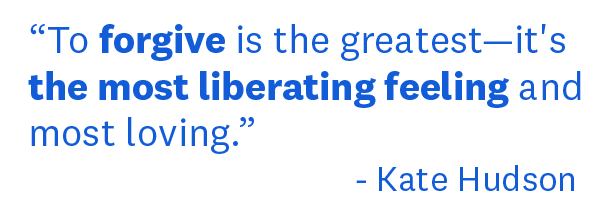 OPRAH: To forgive him for not being there? To forgive him for the divorce?
OPRAH: To forgive him for not being there? To forgive him for the divorce?
KATE: To forgive him for not having the capacity, you know? It's not a fault. It just is, isn't it? So sometimes I just—I had to learn to understand that he had his own journey and he—he didn't have it in him. You know, it's just—it's not in his lifestyle. So the forgiveness has helped me heal. And in that, I can find a real kind of peace and—and that's where I—you know, that's my journey. I mean, I—there's all these great things that you do and all these wonderful—you know, I feel really lucky. But at the end of the day when I, like feel like my life's journey comes to an end, I want to feel really at peace.
OPRAH: Yeah.
KATE: And I just practice that. Like forgiveness is the number one thing to feel that.
OPRAH: Yeah. When you're disappointed and you don't get what you want—
KATE: (Inaudible.)
OPRAH: Really.
KATE: No. No. No. When I'm—you know, my agent called me once and he goes, I—what is it? I'm more upset about things that you don't get than you don't get. I really am good at letting shi—stuff go.
OPRAH: Yeah. Fiona. Thank you.
KATE: You know, I think that there's things that—yeah, I just—you know, it's like—
OPRAH: There was a role once. I'm trying to think of the movie that somebody else was going to get and then you got. What was that movie?
KATE: Uh-oh.
OPRAH: I don't know. But anyway, it will come to me.
KATE: Oh, Almost Famous.
OPRAH: Yes.
KATE: Yeah. Yes. So Sarah Polley was going to—with Brad Pitt—
OPRAH: Yes.
KATE: Was going to be in Almost Famous and then they ended up not doing it. And then I was able to come and audition.
OPRAH: So Almost Famous made you really famous.
KATE: Yes. That was a really special moment in time.
OPRAH: Yeah. What would you tell your 20-year-old self?
KATE: About, like—nothing. Nothing. I had—honestly, people always ask me. There's a question if you go back and ask yourself—or say something. Right?
OPRAH: Yeah.
KATE: No way. I was, like the best—I had so much fun. There were mistakes. There were mistakes made. There were people that I wish I'd treated better. And—and, you know, but I don't—I don't have any—I wouldn't tell her anything. I'd be, like, have fun.
OPRAH: You're doing it, girl. And now you're the mother of three.
KATE: I am.
OPRAH: How's raising a daughter different?
KATE: Oh, it's so different. In the beginning, obviously, you're—you know, you're breastfeeding and—oh, there's my—but once her personality started to come, energetically it really is so different. She's—she's so girly. I mean, it's like—even from the sounds to the way she talks. I mean, none of my boys talked like she—she has her own language. I mean, she's having conversations with herself. She doesn't—you know, and she, like, literally just doesn't stop talking. But I think that being older, too, and having a baby—I was 24 when I had Ryder, and now being 40 with Rani, I think I soak it in differently. I just want to—
OPRAH: And how are you balancing it all? We've done a lot of talk today about balance. You have a 15-year-old—he's 15. Right?
KATE: Sixteen.
OPRAH: Sixteen. And now a young baby.
KATE: And eight.
OPRAH: And eight. How do you manage all that?
KATE: I mean, it's a lot of schedules. There's a lot of calendars. And my—
OPRAH: Are you actually driving around?
KATE: I mean, honestly, I've got three dads, which is rare. And—(laughter)—it just turned out that way. You know? I—I can't, like — if you would have told me in high school that that's what my life—I definitely would have been, like, no, you're crazy. But, yeah, that's what happened.
OPRAH: How do you manage them all during the holidays?
KATE: Well, some of them we all just have them together. And—no, I have everybody on the same schedule. It's just, you know, scheduling. So, like, I have the kids—both of my boys I have for the first week of Christmas or the second week of Christmas. I just made sure we're all the same. And I think it's more about how we raise kids together. And I think it's all ego. I think you just have to put the ego aside and really put the kids first—and it's hard. That's a really hard thing to do.
OPRAH: I heard that you made a concentrated effort to never commiserate with your sons about their fathers.
KATE: Never. Ever. Even if I can't stand it. Them. (Laughter.) Those are the hardest moments. I'm, like, you know—even when they have—you know, if there is a moment, don't come to me and talk about your father like that. I don't—I think it's really important that kids stay respectful of their parents. Even if you know that their parent could be making a better choice. Like I think your kids will grow up. They will know. They will discover—
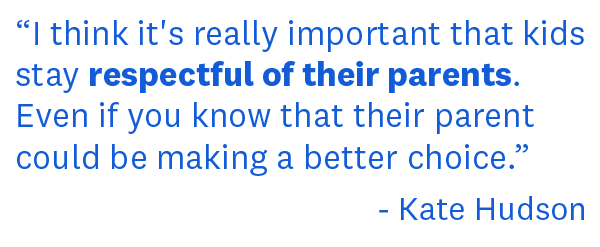 OPRAH: They'll figure it out.
OPRAH: They'll figure it out.
KATE: Yeah, they'll have their own relationship with their parent.
OPRAH: So you've never said a disparaging thing to either of them.
KATE: No. No. I would never do that.
OPRAH: That is really good.
KATE: I think your kids—I think they would resent that. I know my mother never did that about my father. And she really could have. You know? It's like—and she just was—(laughter)—sorry, dad. I love you. But—but, you know, she really could have. And never, never said a bad thing about my father.
OPRAH: Yeah.
KATE: She really was wonderful. Because when I got older I could—I understood why she did that.
OPRAH: You were saying that your mother epitomizes—does she epitomize for you what a good mother is?
KATE: Hmm. (Laughter.) Yes. With an extraordinary life. And I think that she—my mother did probably the best possible that you could ever do having the kind of extraordinary life that she had.
OPRAH: This is a question I asked Tracee Ellis Ross last week. Did you grow up in her shadow or her light?
KATE: Oh, her light.
OPRAH: Light.
KATE: Yeah, I want more of that all the time, you know.
OPRAH: Yeah.
KATE: I think—I think that's something I—I think that there is—yeah, I mean, truly in her light. And I—
OPRAH: Was it complex?
KATE: Very.
OPRAH: Finding your own light.
KATE: Very.
OPRAH: How do you find your own light when your mother's light is so bright?
KATE: Well, she shares it. You know, I think—I think you find your own pocket. You know? And I think that you—it does develop a different kind—probably a different kind of personality. Like, you know, a good example of it is—a fun example of this, it's not complex or deep, but, like, going shopping with my mom is, like, watching the joy tornado go through a shop, like nobody shops like my mom because she doesn't—she's, like, changing in the shop. She just wants to get in and out, you know. She's—not enough hours in a day to do the things that she wants to do. And she leaves everything. I mean, the glasses here. And her fanny pack over here. And the phone's over here. And I'm doing this the whole time. I'm, like, picking stuff up.
OPRAH: Following her around?
KATE: I've got this. Hi, nice to meet you. Hold on. I've got to get my mom's phone. Where's my phone, honey? I've got it. I grew up her gatekeeper. You know. And that's what I felt like. And we actually had a psychic once say to both of us, we were in the same room. She goes, you know, you are your mother's gatekeeper. And you sat outside in Medieval times. I don't know. And I was, like, oh, my God. Yeah, that's me. I'm—I just sit outside her door making sure that everything's fine. And—and—
OPRAH: I've heard that you once said that you learned how to let her be the butterfly.
KATE: Oh, yeah. You know, I think that—and she's a true butterfly. I mean, with the most extraordinary wings.
OPRAH: And you believe your goal as Goldie Hawn's daughter, actually, helped inform your life as a businesswoman. How so?
KATE: I think because I am a very—I think I—the roles that you create in a family dynamic like that, and I think everybody has it. There's always a personality, you know, and mine was definitely a bit of an overachiever. You know? It was like, okay, you know, this is my mother. And that's her—you know, she's this incredible light beam. And I—I'm a performer through and through—always thought I'd be on a stage singing. But, you know, and acting and performing and all of that. But, like, I—in my mind I was always, like, okay, I'm going to just make sure—I'm gonna make sure that things get more practical. And I think that's why my life ended up the way it's ended up, you know, I'm definitely—the business seems to be really—I love it.
OPRAH: What's the smartest advice anyone ever gave you about business?
KATE: Well, I'm hoping you and I are going to have a drink. And you can give me some great advice. (Laughter.) That's the only advice I want.
OPRAH: Thank you.
KATE: You know—
OPRAH: Listen, I can become much wiser on the second shot. (Laughter.)
KATE: Honestly, authenticity.
OPRAH: Yeah.
KATE: I think the best advice I have gotten from a lot of interesting businessmen and women is—is being authentic in my purpose. And that's kind of for me in business and my career and everything is purpose-driven. Why are you doing it?
 OPRAH: Why. So why did you go into—I know Fabletics—what happened with that? You just said I am going to do Fabletics?
OPRAH: Why. So why did you go into—I know Fabletics—what happened with that? You just said I am going to do Fabletics?
KATE: Mm-hmm.
OPRAH: And a vodka line. Happy x Nature. I'm just gonna do it all.
KATE: I'm just gonna do it. Yeah, because I think that—I think for me, you know, we get a lot of—
OPRAH: How hands on are you?
KATE: Very hands on.
OPRAH: Very.
KATE: Like almost to the point where I was walking with our friend Reese the other day and she was, like, will you stop micromanaging everything? I'm very hands on and—and I have to learn sometimes how to kind of walk away.
OPRAH: But don't—think you and Reese are redefining what it means to be businesswomen in this 21st century—
KATE: Yeah.
OPRAH: —techno-media social media world.
KATE: I hope so. Because once upon a time women weren't able to—and men have always dabbled in business and performing arts. And women, it's like if you were doing business and performing arts, forget it. You'd never get hired as an actress again. And I think it's so nice now to be able to do multiple things. I also—I also think, too, it's like, you know, it's still—it's still a challenge. And so it's nice to have that kind of platform to hopefully, like, make change for other people who follow us. I think Reese is doing such an amazing job.
OPRAH: She is. On all levels. I love how you described meeting her at age 12. You said she worked the room like a politician.
KATE: Oh, nobody—nobody like Reese. Well, we were at a party and—and there was every amazing musician.
OPRAH: I remember.
KATE: It was a small party.
OPRAH: Yeah.
KATE: And Reese got up and was, like, well, everybody's gonna sing. And we were, like, Reese, no. It's Neil Young. You know?
OPRAH: No, you know what it was? Everybody was—let's just go all the way. It's—this was a party at Paul McCartney's house. You were at Paul McCartney's house telling people what to do.
KATE: That's Reese. No. You have to sing a song. You have to sing a song Like, Reese, it's Paul McCartney.
OPRAH: And Paul was, like, I don't want to play a song. And she goes, Paul, get over here.
KATE: And then Oprah and I were sitting there and we're, like, looking—
OPRAH: No. And Willie Nelson was sitting next to me and he was, like, smoking something asking me, do you want something? It's like...
KATE: Yeah, it was.
OPRAH: That was a party. Close your ears, Fiona. (Laughter.) For you, connection is your happy place, though. Right?
KATE: Absolutely. Connectivity, to me, is everything. My friends, my family. Number one, my children. But I just think that my human connection gives me so much joy. And I really do love it. You know? I do—I do love it. I don't—I like being transparent. I mean, obviously I like to keep some things private. But I like being open. I like being able to really just meet people and look people in the eye and—
OPRAH: What are you proudest of right now?
KATE: My kids.
OPRAH: Ah. That's your real work. I was asking if your mother was a good mother. Are you a good mother?
KATE: Yes.
OPRAH: And what makes a good mother?
KATE: I care—I—I love my—everything I do is for my kids. And I—I see my son. He's 16. This is the age where you're, like, oh, what—you know, what's gonna happen? Are we—are we moving in the right direction?
OPRAH: Yeah.
KATE: And it's an age where you get to let your kids fly a little bit. And you're, like, okay, I've got to let go. I've got to let him figure it out. Is he gonna come home drunk? That's gonna be a hard—
OPRAH: Have you had the drunk talk?
KATE: Oh, yeah. But my boy is awesome. And he's open and he's communicative. He talks about his feelings, which—more than anything. He talks about what he needs from me.
OPRAH: Wow.
KATE: Like he'll say I really want to spend some time with you today. And I'm, like, honey, let's do it. You know, at 16 to be able to—because you want them to go do their thing.
OPRAH: Yeah. But you also want them to be able to ask for what they want and need.
KATE: What they want. And he's kind and—and he's fun and he's hilarious. And I just—you know, I'm really proud of him.
OPRAH: Yeah. And do you sit back and you say: I've done a good job.
KATE: I feel like—I mean, sometimes. But I also want—like my mom always said you must be so proud of your daughter. She said pride I have a hard time with because it's, like, it's mine. And she's not mine. She's her.
OPRAH: Yeah.
KATE: And I feel that way about my kids. It's like I look at Ryder and I'm, just so happy that my son is someone that I just look—can learn from and look up to, too. You know, that—that's what he's turning into.
OPRAH: That's when you know you've done a good job.
KATE: That's what I feel like, yeah.
OPRAH: So we're setting our wellness intention, our vision for 2020. Do you have one?
KATE: Um, I have so many. I know in the workbook I'm trying to zero it down. But my wellness intention for 2020 is consistency. Consistency in everything that I do. I'm, like, is that the wrong answer?
OPRAH: No, I was waiting. I'm trying to—I was waiting on you to tell me. Consistency in what?
KATE: Okay, like consistency in my exercise. You know, right now I'm finding it's the last thing that I do. Because I wake up, I have the kids and I need to go to work and then I have a call. Like consistency in—and also for me my wellness is making sure that I know how to shut it off. So meditation. Doing the things?
 OPRAH: Do you meditate?
OPRAH: Do you meditate?
KATE: Yes Yes. But, again, it's, like, my 5:00 going down. Like I want to do it every day. And I miss days.
OPRAH: But the days that you do it, you're so much better, aren't you?
KATE: Yes.
OPRAH: Yeah, I know.
KATE: It's the best. You can't even—in the hardest time of my life that was the most uncomfortable time of my life, that was my thing. Like I did not miss a meditation. I did not miss a therapy session. And it changed my whole—I mean, that was the most life-changing thing for me.
OPRAH: Yeah.
KATE: Was the daily meditation. It's crazy how—how powerful it is?
OPRAH: It is. So your 2020 vision, your word is consistency.
KATE: Consistency.
OPRAH: Yeah. And you're going to be consistent.
KATE: For self-care.
OPRAH: For self-care.
KATE: Like make sure I do something for myself every day.
OPRAH: Yeah.
KATE: Yeah.
OPRAH: I can't believe you came to San Francisco.
KATE: I love you so much.
OPRAH: Thank you. And we must, after the show—
KATE: Have a cocktail?
OPRAH: Have one of your cocktails.
KATE: Yeah.
OPRAH: Let's do it. All right.
KATE: Okay.
OPRAH: Thank you, Kate Hudson.
KATE: Love you, guys. (Applause.)
OPRAH: I'll see you backstage. Get the lime ready.
Follow @WW.Now on Instagram and Facebook for more from Oprah’s 2020 Vision Tour!
Find out more about the special guests on Oprah’s 2020 Vision Tour!
